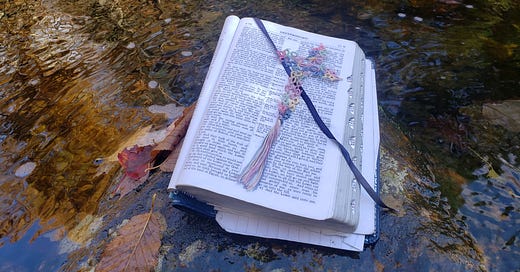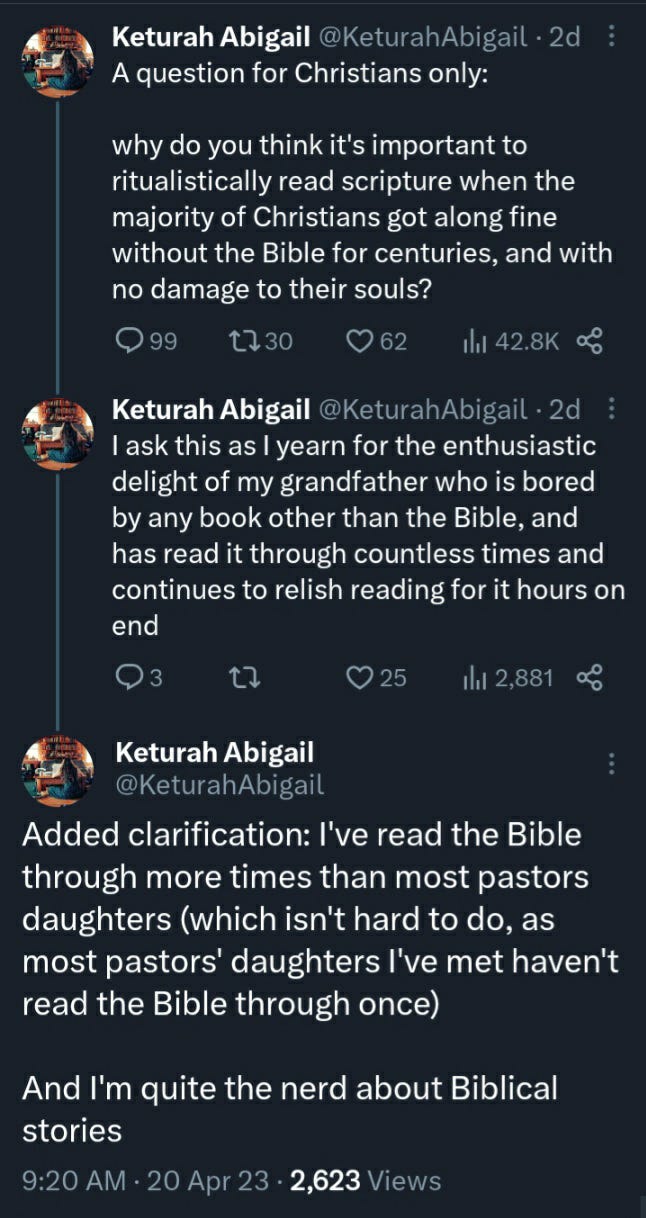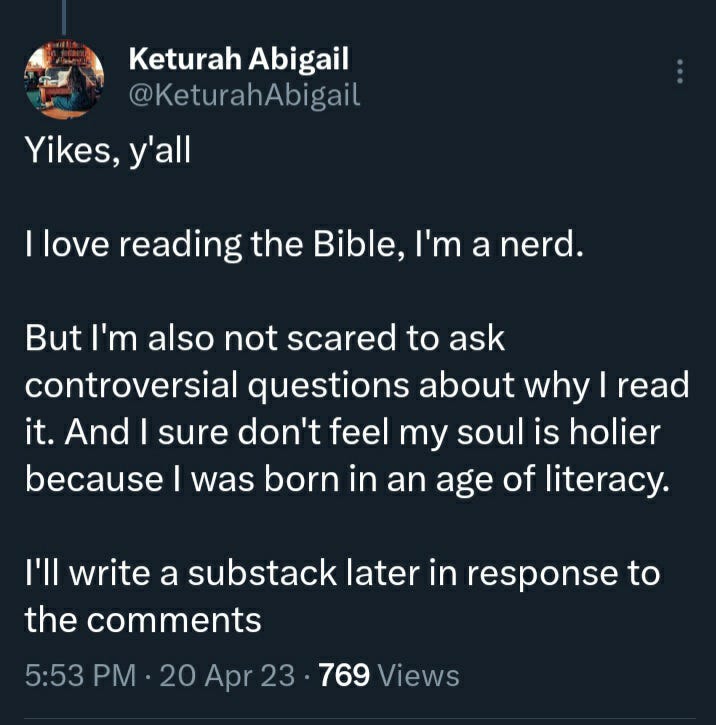The Lost Art of Oral Storytelling: Does Reading the Bible Make You Holier?
In which I prove there is little difference between a provoking thought and a controversial question. The cat lives on, and so can your curious soul.
In order to properly value the Bible it's important Christians ask why they read it. Reading it because you feel you should is like saying the sinner's prayer because you are scared of hell. It's no fun. (If you think the Bible should be boring, then remain as you are).
I asked this question on Twitter a few months back. Angry comments streamed in my notifications. I muted the post. I by no means implied that the Bible should be burned, I was merely curious. Who came up with the idea that your soul is in danger if you don't read the Bible a little every day?
Before the printing press, Christians didn't ask after each other's favorite Bible verses. Mothers weren't guilt tripped into having solitary morning devotions. There were no highlighters, no journal Bibles, no cozy sweaters for the me-time-with-Jesus-is-my-boyfriend reading. There weren't gorgeous illustrated children's storybook Bibles that had all instances of concubine changed to wife. What has changed? We can't blame it all on the printing press, can we?
Let's just take a quick look at how scripture was preserved before the printing press.
While the sixty-six books of God's words (thirty-nine before Christ) was accepted as one book long before canonization authorized its final compilation, the common folks didn't have regular access to the Bible. Yes, many heard it read to them in the temple, via letter, and in church when the Orthodox and Catholic churches were established. Even so, access to the Bible was a sacred thing, and not something that the peasant studied but something that was heard and received.
The common folks had only these duties: to pray, to sing, and to share their stories. Scripture was handed down, like lore and legend, through elaborate oral retelling. In fact, this was written as a commandment in various places. Here's an example from Joel 1:
"Tell ye your children of it, and let your children tell their children, and their children another generation."
These days everyone has his own book and he is able to do that which is right in his own eyes (and to prove it with a long list of scriptures). And although we have God's word readily available—often you can find half a dozen copies of the Bible free at any thrift store—we are witnessing something similar in our modern times as to the days when Israel forgot their Elohim and went to whoring after other nations and Gods because they forgot to tell their children the stories of what God had done for them. We have few community gatherings to hear scripture read. Yes, we have the printing press, but at the cost of a decline in oral storytelling.
I'm not saying this is true of all churches. One thing I've been most pleasantly surprised at in Catholic and Orthodox churches is how they read long passages of scriptures during mass. You'll rarely see this in a regular protestant church. Oh, you might hear a parishioner say to the preacher, "Thank you for all the scripture you read today!" When really the preacher merely cut and pasted five different fragments of scripture to suit his sermon. In mass, a priest doesn't use scripture to fit his words, but has a few words fitted to the days' assigned passage.
It's bizarre how people are so willing to tear up the Bible to suit their own ideas. I'm always stunned when people ask me which verse I like best, as if something so large can be condensed to a few words I prefer. Why not ask me who my favorite prophet or biblical person is? Or what passages I've been memorizing? Or, if you must have a favorite, ask me what my favorite story or psalm might be.
It isn't the way of the pilgrim to pretend to be some scholar, capable of presenting fractured parts of God's word to be reconstructed in such a way one deems worthy so as to prove self-induced arguments. In the days before the printing press, it took years of education before one could dream of throwing scripture back and forth in debate. And even then, rarely did a woman assume the burden of needing to know matters of theology, although the woman was viewed to have a naturally wise spiritual disposition.
These days, though, if someone has something thought-provoking to say, another believes they are capable of responding with nothing but a long list of irrelevant Bible verses. And then another bystander, self-instructed or taught in some luke-warm seminary, may say, "Thank you sister, I appreciate the scripture" as if it proves anything. This does nothing except mock the words of God by turning them into weapons of personal agenda. Just because something can be disproved with scripture doesn't mean it should be.
By this point, I hope you can pick up the obvious nuances—I'm not arguing against reading the Bible, but for a return to appreciating these ancient stories as a community. I'm not even saying we should quote just one verse of the Bible ever (obviously I've done it in this post), but that we should be careful when we quote scripture to not tarnish the reputation of God. It is a beautiful garnish.
We are prone to judge one another, to see the specks of dust in other Christians eyes. It is no wonder that we've managed to turn something as beautiful as the Bible into just another thing to throw at one another. In many ways, I feel Christianity must've been slightly better off when they could only share stories and didn't have the ability to throw pieces of misconstrued Bible verses at one another. But it doesn't end there. A child feels justified in not accomplishing their chores because they have decided God wants them to repeatedly read the Bible (this is not an extreme, but a witnessed example). A mother or father may feel called to neglect their duties if they don't lock themselves away to read alone—or perhaps members of their church will tell them they ought to feel guilty if they don't abandon ship at times to get on their own to read. This is such an individualist mentality that would've been a complete foreign thought in the days the Bible was recorded.
As for reading the Bible on one's own, I would offer a word of caution. Do not be dogmatic about it. You really only need to have read through the Bible once to understand it as we all should: that is as a child would. After that, read it for enjoyment, but not to become an equipped narcissist. Read it to understand others. Read it so that you can become a better storyteller. Be glad for the gift of the printing press—whether you’re a christian anarchist or prefer to blend in with the status quo. You now have the freedom of choice to read for yourself. But remember, that the Bible was designed as a book for God's people. It is better to be read to you than for you to enter your own little world on an island where there are no neighbors to rob or love, no husband's wives to lust after, and no churches to offer a tithe.
I reiterate: I do not mean to discourage people from reading their Bibles. Rather, I exhort you to do so, and to enjoy it as long as you don’t put other gospel virtues on the back burner. Be grateful for your Bible, be humbled, but remember that literacy will never equate holiness.
My own experience with the Bible has been strange and wonderful. My grandfather, who I think of as a scholar of the Bible, didn't read to us, but told us grandchildren stories from it, some them too obscure to be included in any children's story book. I remember falling so in love with his stories that I wanted a Bible of my own, and finally got a pink Precious Moments New King James when I was ten. For a long time I didn't even read it though, but just looked at and memorized the table of contents. Then I was ready. I took a break from reading any fiction books whatsoever, and started reading through my Bible when I was eleven years old (by this time I'd bought a leather bound King James version with some cash I'd carefully saved). I read through it slowly, without any reading plan, and finished when I was about twelve. Since then, I've revisited many of the books, and so have probably reread through the Bible a couple more times, but never intentionally or with much effort. I've simply enjoyed having my Bible. Through all of my teen years I read it everyday in the evening. Now I read it less often, but I know a season will come when I want to read it more again with my own children. But never as something obligatory, because I never want my children to believe that it is important to be literate in order to know God. Literacy is merely fun.








I really appreciate this!
Two connections occurred to me while reading: first, Carl Trueman reminding his readers.students that, historically speaking, having a personal Bible, let alone a room in which one could have private devotions, is very rare and recent. Scripture and prayer time were experienced as a community in a way harder to imagine today. Two: I am reminded of how Charlotte Mason encourages parents to tell stories to their children, especially during the youngest years, instead of reading them stories. There's something powerful in telling stories yourself, aloud, and I think we could say something similar in general about books and storytelling today as the point you're making about the Bible: books are wonderful (I spend most of my time dealing with books in one way or another), but they shouldn't replace oral storytelling. There's something amiss when young parents are behooved to read, read, read to their children rather than prioritizing *telling* them stories—Bible stories, saint stories, folk tales, and family stories, and then letting them know the real world—real rabbits and trees and streams rather than a picture book about them. There's plenty of time for beautiful books. And to prepare someone to be a poet, and to appreciate poetry (including the Psalms!), is to know the real world—real sheep, real shepherds, real hepatica and caterpillars and ants and sand and chocolate-cake dirt.
You make a really interesting observation. I’m a cradle Catholic, and the day my flirtations with Evangelical Protestantism ended was the day my mother pointed out that whilst it’s good to read the Bible on your own or in a Bible study, the Church, in her love doesn't leave it to chance that you happen to be literate. If you attend mass every Sunday, you get 95% Bible in 3 years read to you. If you go every day, you get the last 5%. You have to be paying attention and have a decent preacher as priest to make the most of it. But it requires little effort, all the hard work of figuring out what’s appropriate, connected or relevant is done on the front end of forming the lectionary and all you need is someone to read it! Mind you, it was partially in response to biblical literalism in Protestantism that there was *more* scripture added to the liturgy after Vatican II. Catholics might not have memorised scripture verses or have a favourite typically. They do know the stories though and what comes when and likely to have a favourite parable or story.
I’ve always wondered how far less liturgically-oriented Protestant Churches decide *how* to order their services if you’re not going to follow seasons and just mark Christmas and Easter. Do they just make it up as they go along? Do you pick random months as a theme? Why is that somehow ‘better’ or more biblically sound? That sounds like a hell of a lot of work for a poor pastor who has to reinvent the wheel all the time… I’ve never gotten a good answer from the pastor I was in contact with or my non-denom/evangelical Protestant friends…